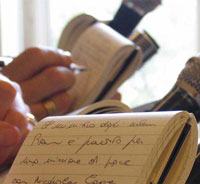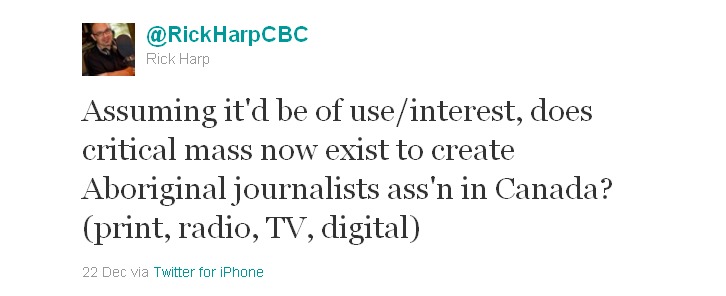Aboriginal Journalists Assemble!
 Ho-leh, the Canadian media world is getting browner and browner these days.
Ho-leh, the Canadian media world is getting browner and browner these days.
Or so it seems to me. From print to radio to television to the world wide interweb, a new Indigenous face or voice practically emerges every few weeks. To my mind, that is an indisputably good thing for all concerned, not least, for Canadian audiences.
There was once a time — perhaps even as recently as the 1980s or 1990s — when you could maybe count on one or two hands the number of working Aboriginal journalists combined in this country. These days, I bet APTN National News’ core of reporters alone would exceed those tiny totals of yesteryear.
Indeed, you could say we have achieved critical mass in this regard.
Oh yeah, I did say that. (I’m so prescient.) Or, at least, I raised the possibility that a ‘tipping point’ has been reached in the numbers of First Nations, Metis and Inuit journalists now plying their trade North of 60.
But see the other piece to my tweet? The bit where I implicitly ask what more can be made of all that storytelling talent, experience and skill? Could that corpus of creativity perchance be amassed and thereby generate a whole that’s greater than the sum of its parts — in, say, the form of a Canadian Aboriginal Journalists Association? (First order of business: find a far better name.)
Here, I’m simply thinking of some form of regular, quasi-formal, in-person networking where participants from all four corners of Canada would connect and compare their experiences. Beyond that, it’d be up to us ‘members’ to decide what we did when gathering together. It could be no more complicated than enjoying over drinks the shared relief of not always being the only brown voice bobbing about in a vast sea of non-Aboriginality back in our respective newsrooms. (APTN being one of a few obvious exceptions.) But, knowing the wide pool of wickedly smart Indigenous journos that exists out there, I’m confident we’d figure out all sorts of cool reasons to connect and craft a multitude of ways to help each other out personally and professionally.
That’s the vague idea, anyway — deliberately so, in fact, because any truly member-based association would necessarily have to be member-driven.
So, my fellow AboJournos, I invite you to tell me what you think of all this in the comments area below.
Meantime, as you compose your thoughts, take a glance at the compilation of Aboriginal ‘media tweetas’ below. It should give you an idea of just how many Indigenous press types are out there. It is indeed a respectable number, an ever-evolving list to which new names will be consistently added, I expect, so check back often.
UPDATE [6 July 2018] Well, I’ll be: Storify, the tool I was using to compile that list of Indigenous journalists on Twitter is no more as of two months ago. I will have to find another way of presenting that list.



indigenous communications workers association.
Would love to see a mentoring component for recent & soon-to-be graduates looking to break into the industry.
Ditto! 🙂
How about a north of the border, our own version of NAJA (Native American Journalist Association)? As a freelancer based at home in the bush… I could use more interaction with other journalists as well as professional development opportunities.
The Social Planning Council of Winnipeg would like to organize an Aboriginal Communications Conference. Any interest in participating?
The Social Planning Council of Winnipeg would like to organize an Aboriginal Communications Conference. Any interest in participating?
It’s getting browner and browner because companies have diversity quotas and goals. I don’t know how I feel about that. I don’t want a job just because of my skin colour, but I’ve been offered jobs I’m not even qualified for, just because I’m NDN. I want the money, and they say, “Don’t worry, we’ll train you on the job.” That’s not what the ads say.
Very tempting, but I know there were people much more experienced applying for the same job. I don’t want to be a statistic!
In my experience, the journalism profession has, fairly or unfairly, consistently seen fit to draw a sharp line between their realm and that of communications people.
That said, not a few people have gone back and forth “over the wall.” What do you have in mind?
“I’ve been offered jobs I’m not even qualified for, just because I’m NDN.”
No doubt this has happened in some people’s cases — perhaps even in my own, for all I know. That said, I can say with great confidence that if you can’t swim when thrown into the choppy waters of a constant, unforgiving deadline, you won’t stay afloat for long. Survive in the newsroom environment, and do so consistently, it probably matters less and less how you got in the door as you proceed along.
Few occupations actually practice anything resembling a true “meritocracy,” so I have evaluated my journalistic performance based mostly on whether I made it to the finish line, not so much where my starting line was, if I may be permitted so awkward a metaphor. But I take your point and appreciate you sharing it.
would love to see more aboriginal writers out there. I’ve been writing for the Anishinabek News lately here in Ontario and I love it and I write aboriginal children’s storybooks. Check out my website at http://www.porcupineandfriends.com
With this impressive (and seemingly ever-growing) number of people who’d be potentially interested in any assembly of Aboriginal media-makers, the only question now is where and when we might gather. Just to get the ball rolling, I nominate the amazing imagineNATIVE Film + Media Arts Festival, which is held every October in Toronto. Here is their website: http://www.imaginenative.org/
I was a journalist for the mother corp in the early 90’s – due to budget cuts- I finally went the documentary route. I needed a mortgage – so here I am a communications coordinator for a non-profit. We want a discussion about how the messages are being relayed and how race plays a roll.